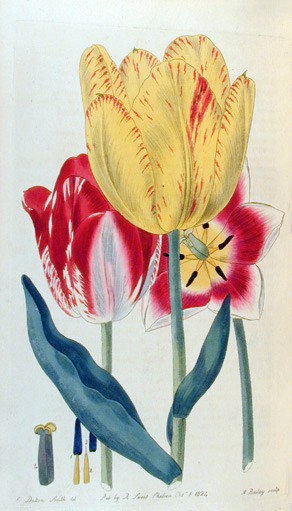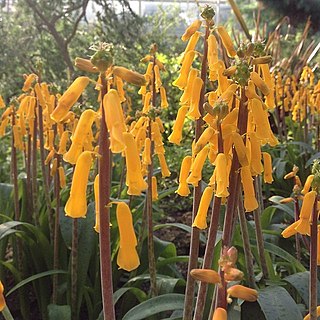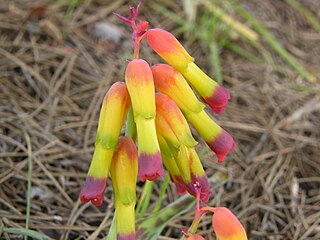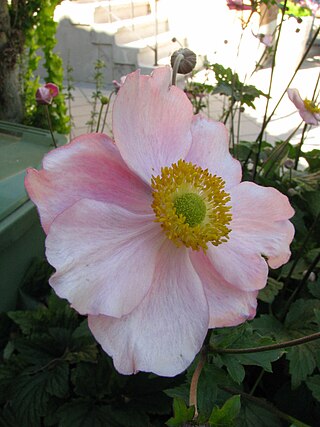
The Royal Horticultural Society (RHS), founded in 1804 as the Horticultural Society of London, is the UK's leading gardening charity.

Agapanthus is a genus of plants, the only one in the subfamily Agapanthoideae of the family Amaryllidaceae. The family is in the monocot order Asparagales. The name is derived from Greek: ἀγάπη, ἄνθος.

Grevillea, commonly known as spider flowers, is a genus of about 360 species of evergreen flowering plants in the family Proteaceae. Plants in the genus Grevillea are shrubs, rarely trees, with the leaves arranged alternately along the branches, the flowers zygomorphic, arranged in racemes at the ends of branchlets, and the fruit a follicle that splits down one side only, releasing one or two seeds.

Robert Sweet was an English botanist, horticulturist and ornithologist.

Lachenalia is a genus of bulbous perennial plants in the family Asparagaceae, subfamily Scilloideae, which are usually found in Namibia and South Africa. Most of them have a dormancy period, but new roots will always grow every year.

Symphyotrichum ericoides, known as white heath aster, frost aster, or heath aster, is a species of flowering plant in the family Asteraceae native to much of central and eastern North America. It has been introduced to parts of Europe and western Asia.

Allium cristophii, the Persian onion or star of Persia, is a species of flowering plant in the family Amaryllidaceae, native to Iran, Turkey, and Turkmenistan, though grown as an ornamental bulbous plant in many parts of the world. It may be sold under the synonym of Allium albopilosum.

Acer palmatum, commonly known as Japanese maple, palmate maple, or smooth Japanese maple (Japanese: irohamomiji, イロハモミジ, or momiji,, is a species of woody plant native to Japan, Korea, China, eastern Mongolia, and southeast Russia. Many different cultivars of this maple have been selected and they are grown worldwide for their large variety of attractive forms, leaf shapes, and spectacular colors.

Lachenalia aloides is a species of flowering plant in the family Asparagaceae, native to the Western Cape of South Africa. It is a bulbous perennial growing to 15–28 cm (6–11 in) tall by 5 cm (2 in) broad, with strap-shaped spotted leaves and fleshy stems bearing pendent tubular yellow flowers, red at the tips, in winter and spring. The Latin aloides literally means "aloe-like"; though L. aloides, despite its similarity, does not belong to the same family of plants as aloes.

Lachenalia bulbifera, syn. L. pendula, is a species of flowering plant in the family Asparagaceae, native to the Western Cape of South Africa. It is a bulbous perennial growing to 30 cm (12 in) tall by 5 cm (2 in) broad, with strap-shaped spotted leaves and fleshy stems bearing pendent tubular orange or red flowers 3 cm long, in winter and spring. The Latin bulbifera literally means "bulb-bearing", and refers to the plant's habit of producing bulblets, which can be separated from the parent plant and grown on.
Graham Dugald Duncan(born 1959) is a South African botanist and specialist bulb horticulturalist at the Kirstenbosch National Botanical Garden, Cape Town, South Africa.
Winsome Fanny Barker was a South African botanist and plant collector noted for her work as Curator building the collection at the herbarium of the Kirstenbosch National Botanical Garden, as well as her research on Amaryllidaceae, Liliaceae and Haemodoraceae.

Lachenalia corymbosa, the corymbous Cape cowslip, is a species of flowering plant in the genus Lachenalia native to the southwest Cape Provinces of South Africa. It has gained the Royal Horticultural Society's Award of Garden Merit.

Lachenalia ensifolia is a species of flowering plant in the genus Lachenalia, native to the Cape Provinces of South Africa. Its nominate subspecies Lachenalia ensifolia subsp. ensifolia has gained the Royal Horticultural Society's Award of Garden Merit.

Lachenalia flava, the golden opal flower, is a species of flowering plant in the genus Lachenalia native to the southwest Cape Provinces of South Africa. It has gained the Royal Horticultural Society's Award of Garden Merit.

Lachenalia orchioides, the orchid‑like Cape cowslip, is a species of flowering plant in the genus Lachenalia, native to the Cape Provinces of South Africa. It has gained the Royal Horticultural Society's Award of Garden Merit.

Lachenalia quadricolor, the four‑coloured opal flower, is a species of flowering plant in the genus Lachenalia, native to the southwest Cape Provinces of South Africa. It has gained the Royal Horticultural Society's Award of Garden Merit.
Lachenalia vanzyliae, the van Zyl opal flower, is a species of flowering plant in the genus Lachenalia, native to the southwest Cape Provinces of South Africa. It has gained the Royal Horticultural Society's Award of Garden Merit.

Lachenalia viridiflora, commonly known as the green-flowered Cape cowslip or turquoise hyacinth, is a species of flowering plant in the asparagus family native to the southwest Cape Provinces of South Africa. It was discovered in the 1960s, and first described in 1972 by Winsome Fanny Barker.

Eriocapitella × hybrida is a hybrid of flowering plants in the buttercup family Ranunculaceae. The parents of the hybrid are E. japonica and E. vitifolia. Cultivars of the hybrid are commonly known as Japanese anemone hybrids.
















